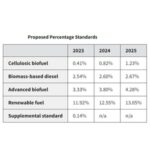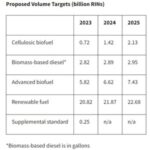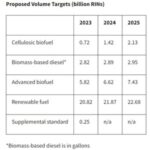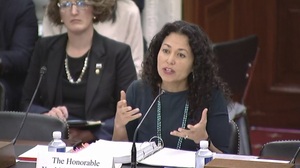Senators call on EPA to set strong RFS RVOs, deny pending SREs
Energy Disrupter
ADVERTISEMENT
A bipartisan group of 12 senators, led by Sens. Amy Klobuchar, D-Minn., and Chuck Grassley, R-Iowa, on Feb. 1 sent a letter to U.S. EPA Administrator Michael Regan urging the agency to prioritize the Renewable Fuel Standard.
The letter specifically asks Regan to abandon plans to retroactively reduce the 2020 renewable volume obligation (RVO), set the 2021 RVO at statutory levels, and finalize the 2022 as proposed. The letter also urges Regan to deny all pending small refinery exemptions (SREs), as proposed by the agency in late 2021.
The EPA released a proposed rule to revise the 2020 RVO and set new RVOs for 2021 and 2022 in December. In a separate action, the agency proposed to deny more than 60 pending SRE petitions. Public comment periods on those actions are scheduled to close Feb. 4 and Feb. 7, respectively.
In the letter, the senators not they support Regan’s efforts to bring more transparency and consistency to the implementation of the RFS program. “While there are aspects of these rules that support our homegrown energy future, our constituents need to see improvements to the proposal,” they wrote.
For 2020, the EPA has proposed to reduce the RVO from the 20.09 billion gallons originally finalized in late 2019 to 17.13 billion gallons. The agency cited challenges associated with the COVID-19 pandemic as the reason for the proposed action.
In their letter, the senators express concern over the EPA’s proposal to retroactively waive 2.96 billion gallons from the 2020 RVO. “These volume were finalized over two years ago in December 2019, and adjusting them downward after the fact would set a troubling precedent and negatively impact the entire agriculture and fuel supply chain,” the senators wrote. “You have stated that the goal of EPA with respect to the RFS is to get the program ‘back on track’ and provide ‘more certainty in the decisions that we’ve made.’ Re-opening RVOs that have already been finalized while setting a precedent that future administrations and EPA administrators may retroactively lower previously finalized RVOs does the opposite of providing more certainty in the program. It would undermine confidence in any finalized RVO by rendering them a moving target at best—and irrelevant at worst.
“Moving forward with these retroactive cuts fails to consider the self-correcting mechanism built-in to the RFS that adjusts biofuel blending to reflect lower gasoline usage,” the continued. “We urge you to eliminate the proposed retroactive cuts to the 2020 volumes and require obligated parties to comply with the 2020 standards that were finalized in 2019.”
For 2021, the EPA proposed to set RVOs at projected volumes of renewable fuel use, at 18.52 billion gallons. The senators are urging the agency to increase the proposed 2021 RVO to statutory levels, noting that “the administration cannot meet its ambitious climate goals without providing for growth and certainty in the RFS.”
The senators support the agency’s proposal to set the 2022 RVO at 20.77 billion gallons, plus 250 million gallons in supplemental obligations that would address the remand of the 2014-2016 annual rule by the D.C. Court of Appeals in Americans for Clean Energy v. EPA. An additional 250 million gallons supplemental obligation would be included in the 2023 RVOs.
Finally, the senators express support for the EPA’s proposal to deny more than 60 pending SRE petitions. “Denying these pending petitions would be a positive step toward bringing integrity and transparency back to the RFS,” they wrote.
The senators are also urging the “EPA to finalize its proposed change in approach to SRE eligibility, which notes that ‘small refineries fully recover the costs of RFS compliance through higher prices on sales of gasoline and diesel, and that as a result they do not suffer economic hardship due to the RFS.’”
In addition to Klobuchar and Grassley, the letter is signed by Sens. Tammy Duckworth, D-Ill.; Roger Marshall, R-Kan.; Tammy Baldwin, D-Wisc.; Joni Ernst, R-Iowa; Dick Durbin, D-Ill.; Deb Fischer, R-Neb.; Tina Smith, D-Minn.; John Thune, R-S.D.; Debbie Stabenow, D-Mich.; Gary Peters, D-Mich.; Sherrod Brown, D-Ohio; and Roy Blunt, R-Mo.
The Renewable Fuels Association, Growth Energy and the American Coalition for Ethanol have spoken out to thank the senators for standing up for the integrity of the RFS.
“We thank this bipartisan group of senators for their efforts to protect and defend the Renewable Fuel Standard,” said Geoff Cooper, president and CEO of the RFA. “These senators understand that the RFS is the most powerful and effective tool we have to immediately reduce greenhouse gas emissions from the transportation sector, keep consumer gas prices in check, and support a vibrant rural economy. RFA proudly stands with them in calling on the Biden administration to follow through on its commitments to put the RFS back on track.”
“As EPA prepares to make several important announcements regarding the RFS this year, the bipartisan backing and leadership of these senators is greatly appreciated,” said Brian Jennings, CEO of ACE. “By taking the senators’ recommendations to abandon the after-the-fact cut to 2020, maintain robust volumes for 2021 and 2022, and reject pending small refinery exemption waivers, EPA can fully utilize the RFS for its enacted purpose, to replace petroleum with low carbon alternatives, which will help grow demand for biofuels that benefit rural America as well as the Administration’s decarbonization goals.”
“The final versions of the recently proposed 2020, 2021, and 2020 RVOs will have an immense impact for years to come on not only the biofuels industry, but also on the environment as our nation works to achieve net-zero emissions,” said Emily Skor, CEO of Growth Energy. “We applaud our Senate champions for showing leadership in this bipartisan call for EPA to finalize strong RVO levels and eliminate any proposed retroactive cuts. By doing so, EPA would be making meaningful progress in the Biden Administration’s commitment to move toward more low carbon alternatives in our transportation sector while supporting farmers and biofuels producers.”
A full copy of the letter can be downloaded from Klobuchar’s website.
















